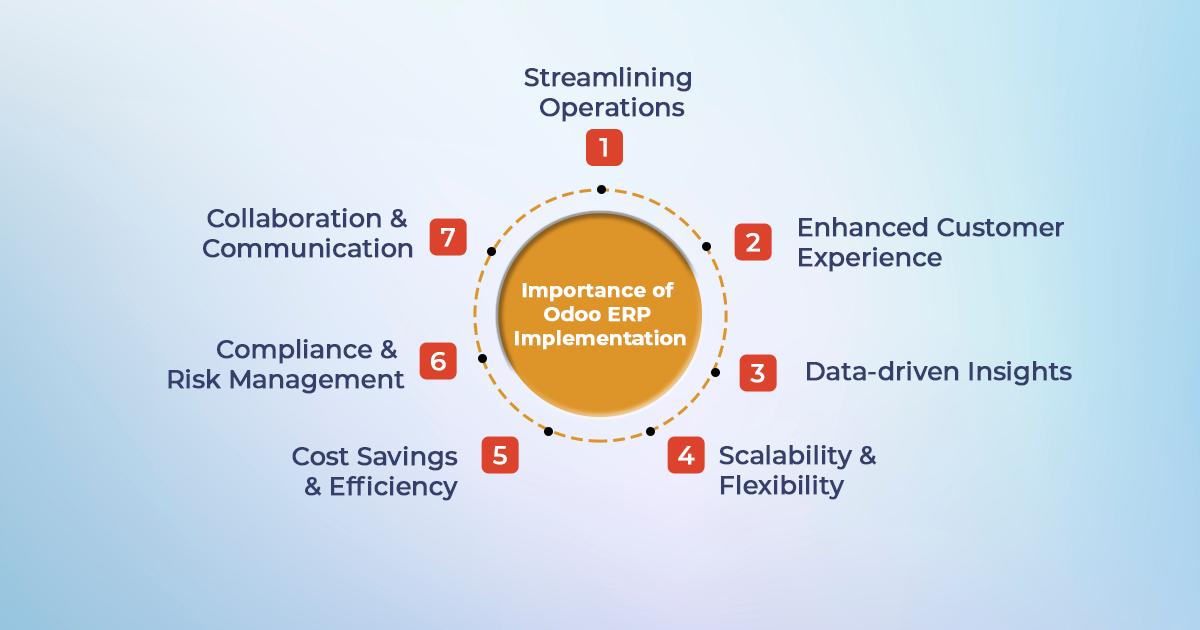Introduction
Regulatory requirements have recently increased in necessity, while risk management has become much more sophisticated thus constructing efficient means of tackling these concerns is key for business. Ongoing developments in the area of enterprise resource planning (ERP) solutions makes Odoo stand out. The flexibility, simplicity of use, as well as the range of applications that characterize this system have made many people think that it is just another platform intended to speed up processes however it has another role which is crucial in enhancing compliance and reducing risks.
Finality of compliance with regulations and risk management is not a matter of avoiding traps but constitutes an important component for the wellness and sustainability of industries. As firms grow or transform, they find it increasingly hard to keep up with the law compliance and risk handling. Thus Odoo ERP Systems are designed to take care of such matters by providing an all-encompassing form of business administration.
The discussion on how Odoo ERP Systems can enhance compliance and risk management in this blog post will be explored in depth. We will consider Odoo features and functions that support one’s compliance efforts as well practical tips on how to build compliant organizations using this software. One way that Odoo can help you improve your compliance and risk management goals if you are either a small start-up or an established enterprise.
1.Centralized Data Management
One of the key and most evident benefits has to do with the central roles played by Odoo ERP systems in managing data. By the system, information shall be consolidated from several departments: finance, HR, the supply chain, and sales. Odoo will ensure that all the information is proper and current and can be easily accessed to enable record accuracy, agility in reporting processes, consistency across functions.
Centrally stored data supports better risk and issue visibility for risk management. In this respect, one can track key metrics, monitor performance indicators, and pick up on anomalies that may serve to indicate emerging risks. This proactive approach therefore enables timely interventions that reduce the occurrence of compliance breaches along with operational disruption.
2. Automated Compliance Reporting
It is tricky to keep up with changing laws and standards to satisfy regulatory needs. Odoo ERP makes it a lot easier because it offers automation features for compliance reporting. Reports can be generated through the system, based on real-time information, which ascertains that the financial statements, tax reports, and other compliance-related documents are timely and valid.
Odoo reporting tools can be customized for business needs so that the reports can serve specific regulatory or internal requirements. With automated alerts and reminders, deadlines will be met, and necessary documentation prepared and reviewed in advance to avoid any threat of non-compliance due to simple oversight or delays.
3. Improved Internal Controls
Internal controls effectively work for risk management and compliance. Odoo ERP extends complete support for an internal control mechanism that includes role-based access, audit trails, and automated workflows. Role-based access ensures that sensitive data can be accessed or critical functions executed by only the authorized personnel, therefore reducing the possibility of unauthorized actions or data breaches.
Audit trails give the business a more comprehensive approach towards having a history of all activities conducted on their system. This is where organizations will be able to track changes and user activities, hence taking up any anomalies for investigations. Automation of processes ensures that processes are followed to the core, and any approvals that are required are obtained before proceeding, hence eliminating any error or fraudulent operations.
4. Integrated Risk Management Tools
Odoo ERP provides integrated risk management tools, allowing any firm to identify, assess, and mitigate their risks efficiently. The system contains modules on project management, quality control, and asset management-all of which can be leveraged in the management of different aspects of risk.
For instance, project management tools allow tracking of the realization of a project, resource management, and ability to show anomalies that appear before they escalate. Quality control modules will facilitate the process of monitoring product quality, conducting inspections, and taking rapid remedial measures whenever defects are detected. Asset management tools provide insight into asset usage, maintenance schedules, and related risks about equipment or inventory.
5. Industry Standard Compliance
Odoo has been developed to be flexible enough to adapt to different industrial standards and regulations. Odoo is able to configure itself to adhere to financial, manufacturing, or healthcare compliances specific to your business needs. In addition, several industry-specific modules and features of the system address unique regulatory challenges and/or support best practices.
By applying Odoo’s industry-specific capabilities, businesses ensure that not only are they compliant with general regulations but also sectoral standards. This gives a more focused approach toward compliance in general and reduces the chances of non-compliance related to the industry.
6. Continuous Updates and Support
Compliancy and risk management are both subjects that require constant attention to newly developed regulations and threats. Odoo ERP systems are constantly updated with new regulatory requirements and state-of-the-art best practices in risk management. The support team from Odoo keeps regular updates, security patches, and guides how to keep your system tuned with current standards and best practices.
Odoo-based business solutions might avail a wider network of support, resources, community forums, documentation, and professional services. Because of such a nature of continuous support, organizations may stay updated in regard to changes in regulatory compliances and manage risk proactively.
Conclusion
The ERP system, with Odoo, essentially provides a full range of features that will dramatically enhance their compliance and risk management efforts for businesses. From a centralization of data, automated reporting, strong internal controls, integrated risk management tools to adherence to industry standards, Odoo can match all needs through its robust enabling platform in addressing the dynamic nature of regulatory compliance and risk mitigation challenges.
Installation of Odoo ERP can revolutionize the way your company does business with regard to these key areas by making them more effective, accurate, resilient, and so on. In today’s dynamically changing regulatory environments and risk exposure landscapes, the implementation of a strong ERP system-like Odoo-prepares a foundation for your business to become successful in a compliant and secure manner.






Leave a Reply